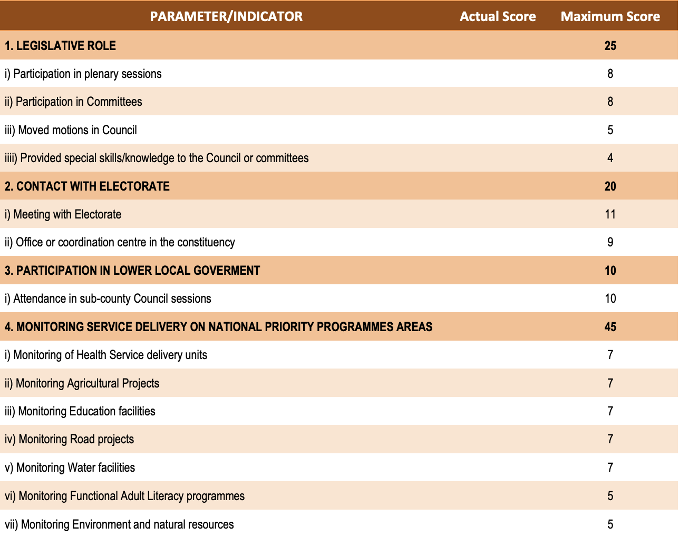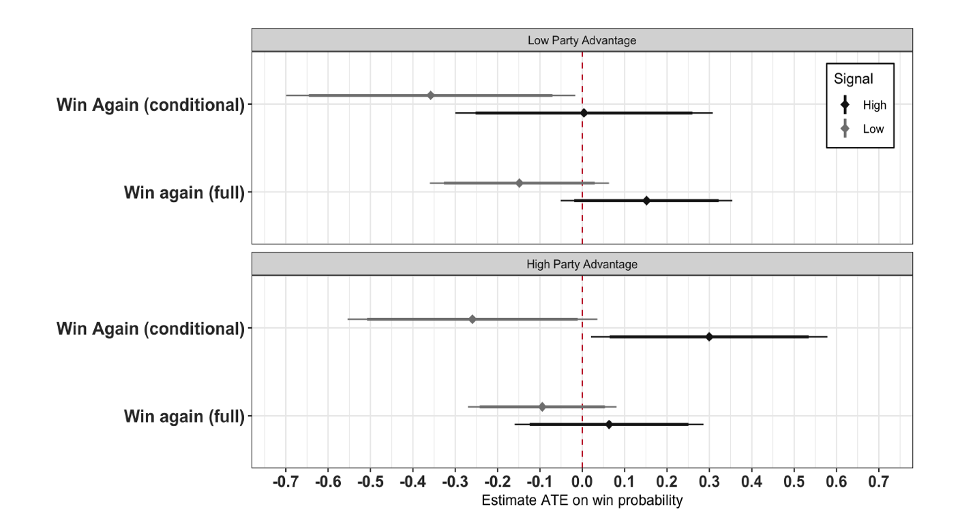Brief 71: Regular and sustained information on incumbent performance improves electoral accountability
EGAP researchers: Kristin Michelitch, Guy Grossman
Other authors: Carlo Prato
Geographical region: Africa
Research question: Can sustained transparency—defined as providing voters with politicians’ performance information in a regular and predictable way throughout their term—improve electoral accountability?
Preparer: Bhumi Purohit
Executive Summary:
Can sustained transparency—defined as providing voters with politicians’ performance information in a regular and predictable way throughout their term—improve electoral accountability? Research to date provides disappointing results on whether disseminating performance information directly before an election can shape voting decisions. The authors argue that sustained transparency can improve accountability, not only through voters’ improved ability to “kick the bums out,” but also by affecting a slate of pre-election decisions (by incumbents, party leaders, and potential challengers) that ultimately shape who is on the ballot. The authors test their theory using data from a field experiment conducted in partnership with a local NGO (ACODE), that produces yearly politician performance scorecards for subnational Ugandan politicians. Encouragingly, the data show that transparency improved reelection of high-performing incumbents, and reduced reelection of low-performing incumbents through multiple channels. First, transparency discouraged low performers in party strongholds from running for re-election (and encouraged high performers from weaker parties). Second, transparency stifled party leaders’ nominations of low-performers and modestly promoted the nomination of high-performers. Third, challengers from rival parties were more likely to run for office when greater transparency revealed the incumbent is low-performing, especially in incumbent party strongholds. While Grossman & Michelitch (2018) find that this intervention increased performance of politicians outside of deep party strongholds during the term, this study shows that the intervention had downstream consequences in the subsequent election. By influencing the decisions of both voters and political elites, our study demonstrates that sustained transparency can reduce the importance of party dominance in election outcomes—a critical step to improve governance in newly democratizing countries.
Policy Challenge:
Democracy hinges on the idea that voters, through elections, are able to reward well-performing incumbents and punish poorly-performing ones. Citizens, however, can only perform this role when they have sufficient information about politicians’ performance and viable challengers are on the ballot. Policy interventions to disseminate politician performance information to date, however, have typically yielded disappointing results when it comes to weeding out poor performers.[1] One key issue with most prior initiatives is that, by disseminating incumbent performance information directly prior to elections, they cannot affect candidate slates. In other words, information is disseminated “too late” for challengers to enter into the race against poorly-performing incumbents. Likewise, it is “too late” for party leaders to consider nominating alternative candidates (or primary challengers to enter and displace a poor performer) or for poorly-performing incumbents to consider ducking out early. Finally, it is “too late” for incumbents to improve their performance in anticipation of greater competition in the next election.
Keeping these challenges in mind, the authors examine whether sustained transparency throughout a politicians’ term can influence not only voting behavior and reelection, but also on incumbent, challenger, and party behavior.
Local Challenge:
The study takes place in Uganda, an electoral authoritarian regime with first-past-the-post subnational elections. While the main party in power, the National Resistance Movement, has maintained an advantage in national and district governments, their hegemony is not as strong when it comes to subnational elections. In parts of Uganda, opposition parties such as the Forum for Democratic Change (FDC), Uganda People’s Congress (UPC) and the Democratic Party (DP) are locally competitive and have made in-roads. The authors take advantage of this variation in party prominence at the subnational level by focusing on district council elections. Voters face an important challenge during district council elections: they tend to have limited information on incumbents’ performance given that media attention is heavily biased toward national politics.[2]
Research Design:
In designing the intervention, the authors worked with ACODE, a local civil society organization that launched the Local Government Councilor Scorecard Program in 2011. The program sought to improve both politicians’ performance and electoral accountability. The scorecard provides a report of every local politician (district councilor) in 20 districts. It includes a rating on a 0-100 scale based on a series of legally-defined duties during a fiscal year (July of a given year to June of next year). An example of the scorecard is provided in Figure 1. Every year, ACODE holds an event at the district headquarters where it distributes incumbents’ scores to local politicians, party elites, district civil servants, and (at times) the local media. However, information in the scorecards rarely reached voters—in summer 2012 (at baseline), only 9% of respondents had heard “at least something” about the scorecards.

The research team and ACODE randomly selected half of the politicians to take part in an “Intense Dissemination” (ID) program, during which they held two rounds of community events at the parish level aimed at reaching citizens. The first set of community meetings were held in late 2013 (354 meetings, 12,949 attendees, using 2012-2013 scores) and the second in late 2014 (339 meetings, 14,520 attendees, using 2013-2014 scores). During the meetings, ACODE representatives shared politicians’ raw scores, their ranking within the district, and the scores of all other district politicians. Politicians were invited to attend these meetings and were therefore aware that information was shared with voters. In order to sustain information efforts, the team distributed calendars, posters, and flyers in prominent places and encouraged constituents to sign up to receive text messages about future scores.
Results:
The study measured the effect of the Intense Dissemination (ID) treatment compared to the baseline initiative at the district headquarters (during which ACODE disseminated information only to party and government elites). The authors analyzed the effect of intense dissemination on a range of district constituency-level outcomes during and prior to the 2016 general election: voting behavior, incumbent behavior, party nominations, and potential challengers’ entry choices.
Election Results:
Sustained transparency increased the re-election likelihood of high-performing incumbents and reduced the re-election likelihood of low-performing incumbents, but only under certain circumstances. The ID program reduced the winning likelihood of an incumbent with lower-than-median performance scores by 7 percentage points (pp). Incumbents with higher-than-median performance scores, instead, were only 2-5 pp more likely to win re-election. These effects are much stronger when the analysis excludes independents—in other words, information seems to matter more when incumbents need to win their party nomination. Additionally, the ID program only seems to help high-performing incumbents hailing from parties enjoying a relatively high advantage in the area (30 pp likelihood of winning re-election compared to zero when party advantage is low). Low-performing incumbents, instead, are punished irrespective of their relative party advantage, as seen in Figure 2.

Incumbent Behavior:
Sustained transparency reduced the likelihood that low-performing incumbents sought re-election by 7.7 pp. It did not, however, influence high-performing incumbents’ decision to seek re-election. These results do not significantly differ as a function of the incumbent’s party local strength. In a previous study using the same experiment, Grossman & Michelitch (2018) also find that incumbents outside of deep party strongholds improved their performance during the term. Thus, the intervention affected accountability via two distinct types of incumbent behavior: running decisions and effort.
Party Behavior:
The ID program reduced party renomination of low-performing incumbents by 10.6 pp, and increased the renomination of high-performing incumbents by 2.7 pp. These results suggest that party elites anticipated (at least in part) the effect of disseminated performance information on voters’ behavior.
Challenger Behavior:
The ID program did not encourage the entry of potential challengers into races where the incumbent’s party advantage is low. In areas where party advantage is relatively high and incumbent performance is low, the program increased the number of challengers by 1.08, a significant increase over the control group. Conversely, the effect on high-performing incumbents is low—a reduction of 0.12 challengers.
Lessons:
The research suggests that transparency of incumbent performance information—when delivered regularly and predictably to the public—can improve the reelection of high performers and reduce the reelection of low performers. Sustained transparency initiatives also allow incumbents, potential candidates, and party elites to react in anticipation of voters’ choices—thereby reinforcing the effects on accountability. While the intervention does not erase the effect of coming from a party stronghold, it does weaken the importance of party organizations in shaping election outcomes.
Given the success of sustained transparency in an electoral authoritarian regime, it is likely that such efforts can have important effects in other newly democratizing developing countries with first-past-the-post electoral rules (i.e., constituency representation). Organizations and policymakers should note that the intervention took place in a setting where parties do not primarily compete on programmatic or ethnic identity issues, so more research is needed to understand how performance information may compete with other factors.
Importantly, this study also suggests that transparency initiatives may be particularly successful when a local NGO provides the information and involves key stakeholders (here the Ugandan Local Government Association, local politicians themselves, district elites). The NGO provided all politicians involved with critical capacity-building training in their legally-defined job duties and explained the scoring of their performance. Sustainability is important in monitoring politicians, especially in a newly democratizing context. It is then crucial that the change in transparency generated by ACODE’s intervention was seen as credible, non-partisan, and long-lasting. This suggests that in order to be effective, interventions should be credible and durable, rather than one-shot.[3]
Watch the Panel Discussion that EGAP organized on February 22, 2021, with Guy Grossman, Kristin Michelitch and Carlo Prato presenting the results of this study and hearing reactions from practitioners Franklin Oduro (NDI), Rhoda Osei-Affu (CDD-Ghana), and Godber Tumushabe (GLISS). The event was moderated by Linda Stern (EGAP Institutional Representative for NDI).